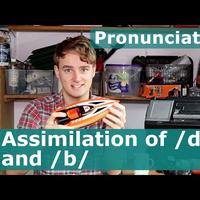28- Assimilation of /d/ and /b/
Hi. I'm Tim and this is my Pronunciation workshop. Here I'm gonna show you how English is
really spoken. Come on, let's go inside.
Now, do you know the word speeb? No, of course not because it's not a real word. Or is it?
Listen to some people in London talking about this.
It's a speed boat. Speed boat.
Speed boat. Speed boat.
Speed boat.
Now, the word speed ends in the sound /d/, doesn't it? Well not always. Watch and listen
again, what sound can you actually hear?
It's a spee? boat. Spee? boat.
Spee? boat. Spee? boat.
Spee? boat.
In everyday speech, when we're speaking fluently, if one word ends in a vowel sound followed
by a /d/ and the next begins in a /b/, then the /d/ changes to a /b/ and then merges with
the /b/ from the following word. So 'speed boat', becomes 'speebboat'. Watch again, this
time in slow motion. Look at the mouth shape. Can you see /d/ or is it just /b/?
Speeb boat. Speeb boat.
Speeb boat. Speeb boat.
Speeb boat.
This is another case of assimilation. Here are some more examples.
My son is a really good boy. I'm sorry if I was rude before.
My car had to be towed back to the garage. You should buy him a present.
So, you've heard the examples, and now it's your turn. You know the drill. Listen and
repeat.
My son is a really good boy.
I'm sorry if I was rude before.
My car had to be towed back to the garage.
You should buy him a present.
Well done. And remember, if you want to learn more about pronunciation, then please visit
our website, bbclearningenglish.com. And that is about it from the pronunciation workshop
for this week. I'll see you soon. Bye bye! Aah - you know, one day I'm gonna get one
of these. Not a toy, obviously, but the real thing. My dad promised. He said if I was a
good boy he'd buy me a boat. That was quite a long time ago actually. I think I was five
years old - and I have been a good boy. Maybe he's just forgotten. I'm never gonna get
my speed boat, am I?

